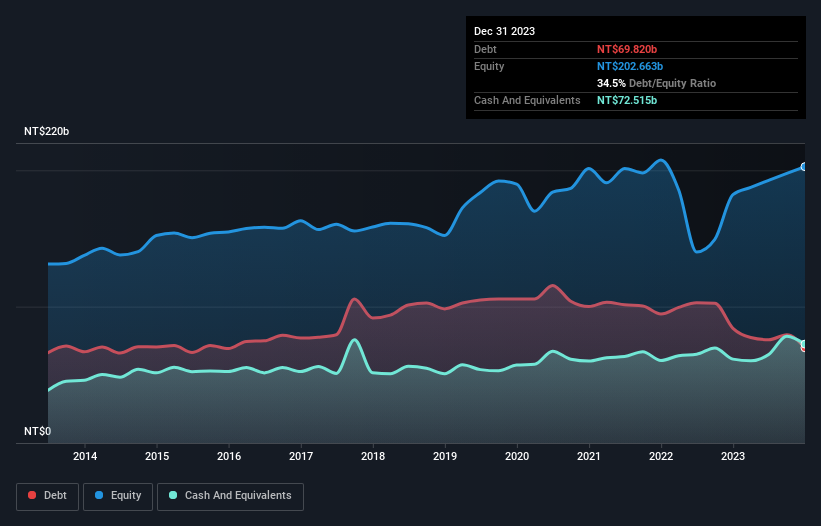Here's Why Pou Chen (TWSE:9904) Can Manage Its Debt Responsibly
Some say volatility, rather than debt, is the best way to think about risk as an investor, but Warren Buffett famously said that 'Volatility is far from synonymous with risk.' It's only natural to consider a company's balance sheet when you examine how risky it is, since debt is often involved when a business collapses. As with many other companies Pou Chen Corporation (TWSE:9904) makes use of debt. But the more important question is: how much risk is that debt creating?
What Risk Does Debt Bring?
Generally speaking, debt only becomes a real problem when a company can't easily pay it off, either by raising capital or with its own cash flow. In the worst case scenario, a company can go bankrupt if it cannot pay its creditors. However, a more frequent (but still costly) occurrence is where a company must issue shares at bargain-basement prices, permanently diluting shareholders, just to shore up its balance sheet. Of course, plenty of companies use debt to fund growth, without any negative consequences. The first thing to do when considering how much debt a business uses is to look at its cash and debt together.
View our latest analysis for Pou Chen
What Is Pou Chen's Net Debt?
You can click the graphic below for the historical numbers, but it shows that Pou Chen had NT$69.8b of debt in December 2023, down from NT$84.1b, one year before. However, it does have NT$72.5b in cash offsetting this, leading to net cash of NT$2.69b.

How Healthy Is Pou Chen's Balance Sheet?
According to the last reported balance sheet, Pou Chen had liabilities of NT$85.0b due within 12 months, and liabilities of NT$39.9b due beyond 12 months. On the other hand, it had cash of NT$72.5b and NT$33.1b worth of receivables due within a year. So its liabilities total NT$19.3b more than the combination of its cash and short-term receivables.
Of course, Pou Chen has a market capitalization of NT$104.0b, so these liabilities are probably manageable. But there are sufficient liabilities that we would certainly recommend shareholders continue to monitor the balance sheet, going forward. Despite its noteworthy liabilities, Pou Chen boasts net cash, so it's fair to say it does not have a heavy debt load!
On the other hand, Pou Chen saw its EBIT drop by 3.6% in the last twelve months. That sort of decline, if sustained, will obviously make debt harder to handle. The balance sheet is clearly the area to focus on when you are analysing debt. But ultimately the future profitability of the business will decide if Pou Chen can strengthen its balance sheet over time. So if you're focused on the future you can check out this free report showing analyst profit forecasts.
But our final consideration is also important, because a company cannot pay debt with paper profits; it needs cold hard cash. Pou Chen may have net cash on the balance sheet, but it is still interesting to look at how well the business converts its earnings before interest and tax (EBIT) to free cash flow, because that will influence both its need for, and its capacity to manage debt. Over the last three years, Pou Chen actually produced more free cash flow than EBIT. There's nothing better than incoming cash when it comes to staying in your lenders' good graces.
Summing Up
Although Pou Chen's balance sheet isn't particularly strong, due to the total liabilities, it is clearly positive to see that it has net cash of NT$2.69b. And it impressed us with free cash flow of NT$26b, being 202% of its EBIT. So we don't think Pou Chen's use of debt is risky. When analysing debt levels, the balance sheet is the obvious place to start. However, not all investment risk resides within the balance sheet - far from it. To that end, you should be aware of the 1 warning sign we've spotted with Pou Chen .
When all is said and done, sometimes its easier to focus on companies that don't even need debt. Readers can access a list of growth stocks with zero net debt 100% free, right now.
New: Manage All Your Stock Portfolios in One Place
We've created the ultimate portfolio companion for stock investors, and it's free.
• Connect an unlimited number of Portfolios and see your total in one currency
• Be alerted to new Warning Signs or Risks via email or mobile
• Track the Fair Value of your stocks
Have feedback on this article? Concerned about the content? Get in touch with us directly. Alternatively, email editorial-team (at) simplywallst.com.
This article by Simply Wall St is general in nature. We provide commentary based on historical data and analyst forecasts only using an unbiased methodology and our articles are not intended to be financial advice. It does not constitute a recommendation to buy or sell any stock, and does not take account of your objectives, or your financial situation. We aim to bring you long-term focused analysis driven by fundamental data. Note that our analysis may not factor in the latest price-sensitive company announcements or qualitative material. Simply Wall St has no position in any stocks mentioned.
About TWSE:9904
Pou Chen
Designs, manufactures, and sells various shoes in Taiwan and internationally.
Flawless balance sheet, undervalued and pays a dividend.
Similar Companies
Market Insights
Community Narratives




